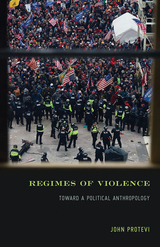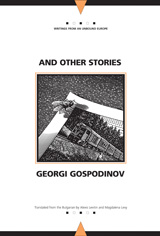

Animal Fables of the Courtly Mediterranean is a treasure trove of stories and lessons on how to conduct oneself and succeed in life, sometimes through cleverness rather than virtue. They feature human and many animal protagonists, including the two jackals Stephanites and Ichnelates, after whom the book is named, as well as several lion kings. At the heart of this work are tales from the Sanskrit Panchatantra and Mahabharata, to which more were added, both in the original Middle Persian collection and its eighth-century Arabic translation, the widely known Kalīla wa-Dimna.
In the eleventh century, readers in Constantinople were introduced to these stories through an abbreviated Greek version, translated by Symeon Seth from the Arabic. The new Byzantine Greek text and English translation presented here is a more complete version, originating in twelfth-century Sicily and connected with Admiral Eugenius of Palermo. It contains unique prefaces and reinstates the prologues and stories omitted by Seth.
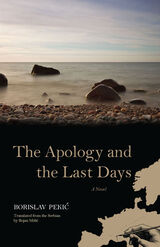
Originally published in 1975, The Apology and the Last Days is the final volume in a trilogy of novels—also including The Rise and Fall of Icarus Gubelkian and How to Quiet a Vampire—about the aftermath of World War II, by Borislav Pekić, one of the former Yugoslavia’s most important postwar writers. The narrator tells his story from prison, where he is serving time for the murder of a former Nazi official. As the novel unfolds, we learn that the victim was the same person whom the narrator, while a lifeguard during the war, saved from drowning, thus making him vulnerable to charges of collaboration. In this tragicomic tale, Pekić explores eternal questions of fate and individual responsibility.

A feverish and unsettling meditation on climate collapse, Arson is told through the fragmented perspectives of two individuals struggling to make sense of a world consumed by fire. An unnamed narrator, a writer plagued by anxiety and writer’s block, watches as the planet, her relationships, and even her ability to dream are ravaged by environmental disaster. Meanwhile, an insomniac scientist, obsessed with tracking wildfires, clings to data as his last grip on control, meticulously recording every flame that devours the forests.
Their narratives unfold in a disorienting rhythm—one slipping between lyrical introspection and panic, the other drowning in statistics and methodical observation. As fires rage across the planet, both search for meaning and survival: the narrator wanders the charred countryside in search of life amid destruction, while the scientist compulsively documents landscapes that should never be burning. Echoing Ingeborg Bachmann’s famous words, “With my burned hand I write about the nature of fire,” Laura Freudenthaler crafts a haunting, kaleidoscopic portrait of a world on the brink. Arson is not just a novel about climate change—it is an urgent, dreamlike reckoning with our fascination and horror at the beauty and devastation wrought by fire.

In Avala Is Falling, Jovanović’s breakout success in 1978, a young woman challenges the expectations that teachers, parents, bus drivers, and doctors have for her. The “Avala” of the title refers to a mountain south of Belgrade which is home to some of Serbia’s most important nationalist monuments and shrines; it is also the site of the main mental hospital for the region, and its “falling” is the unexpected fulfillment of a prophecy from a traditional Serbian folk song. Jovanović’s use of stream of consciousness in her characters’ thinking and speaking, as well as of intertextuality in description and plot advancement heralded the arrival of an innovative new writer who was determined to break with the of traditional concerns of earlier women writers.
This book is now recognized as much more than “jeans prose,” although the fame the book achieved under that characterization eventually pushed it to cult status. Jovanović is now considered a major avant-garde writer, whose stylistic innovations were as challenging as her women-centered themes.
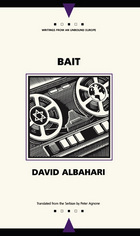
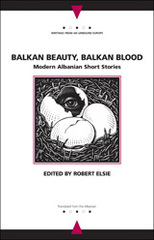
Albania's more established writers (including Dritëro Agolli, Ismail Kadare, Teodor Laço, and Eqrem Basha) appear here alongside newer talents (such as Ylljet Aliçka, Mimoza Ahmeti, Elivra Dones, Lindita Arapi, and Kim Mehmeti), providing English-speaking readers with an elucidating and entertaining overview of the recent history, and the future, of the nation's literature.
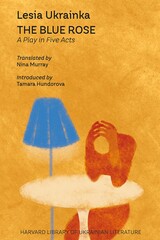
Where is the line that separates the “normal” from the “abnormal”? Liubov, a young Ukrainian woman of small nobility, struggles with this question in Lesia Ukrainka’s The Blue Rose. Living in Ukraine at the turn of the twentieth century, she finds herself outside the norms for a woman: she reads “thick books,” follows music and art, and is interested in science and psychology. She hosts a salon and challenges men in discussions about politics and culture. Liubov is also an orphan whose mother died in an asylum, and she worries about inheriting her mother’s disease as well as passing it on to future children. When Liubov falls in love with Orest, she proposes a radical solution to her dilemma: to pursue something as rare as a blue flower—“pure love” that foregoes the physical and abandons the requirement of marriage and motherhood.
In her commanding debut as a playwright, Ukrainka created a deep psychological rendering of an unattainable ideal. The Blue Rose highlights themes such as women’s struggles for liberation, social progress and its reliance on science, and resistance to change in traditional societies. Written in sophisticated Ukrainian, Ukrainka’s nuanced play helped Ukrainian culture break free of the Russian imperial mold that sought to first provincialize and then erase it. Presented here in contemporary English translation, The Blue Rose illuminates Ukraine’s intellectual history and its connections with Western culture.
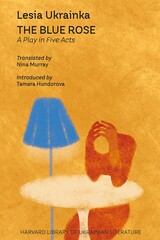
Where is the line that separates the “normal” from the “abnormal”? Liubov, a young Ukrainian woman of small nobility, struggles with this question in Lesia Ukrainka’s The Blue Rose. Living in Ukraine at the turn of the twentieth century, she finds herself outside the norms for a woman: she reads “thick books,” follows music and art, and is interested in science and psychology. She hosts a salon and challenges men in discussions about politics and culture. Liubov is also an orphan whose mother died in an asylum, and she worries about inheriting her mother’s disease as well as passing it on to future children. When Liubov falls in love with Orest, she proposes a radical solution to her dilemma: to pursue something as rare as a blue flower—“pure love” that foregoes the physical and abandons the requirement of marriage and motherhood.
In her commanding debut as a playwright, Ukrainka created a deep psychological rendering of an unattainable ideal. The Blue Rose highlights themes such as women’s struggles for liberation, social progress and its reliance on science, and resistance to change in traditional societies. Written in sophisticated Ukrainian, Ukrainka’s nuanced play helped Ukrainian culture break free of the Russian imperial mold that sought to first provincialize and then erase it. Presented here in contemporary English translation, The Blue Rose illuminates Ukraine’s intellectual history and its connections with Western culture.

This farcical tale tells how the British bombing of a Finnish port city changes the life of the Russian governor, his wife, their cook, and the cook's Finnish fiancé. The story takes place during a Nordic offshoot of the Crimean conflict, known as the Åland War, in which a British-French naval force attacked military and civilian facilities on the coast of the Grand Duchy of Finland in 1854–1856. The location of the novella is Åbo, today’s Turku, where soldiers in the Russian garrison enjoy life, Cossacks dance and drink, and the governor’s wife is preoccupied about her cook’s marriage to a local lad, against which the governor and the English admiral devise a plot.
After studies in Swiss and German universities, Carl Spitteler worked in Russia between 1871 and 1879 as the private tutor in the family of a Finnish general. In the process he came to know Finnish and Baltic noble families in Saint Petersburg and Finland. He published this story in 1889, and went on to become, in 1919, the first Swiss winner of the Nobel Prize for literature. The Bombardment of Åbo is an ironic Western gaze on life and culture in the Tsarist Empire. Spitteler’s deeply held pacifism breaks through his otherwise sarcastic description of the characters and episodes in the novella.
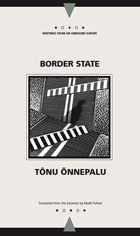
An immediate sensation upon its 1993 publication in Europe, already translated into more than a dozen languages, Border State is a brilliantly realized account of a man in the grip of Western excess, emotionally crippled by a world that is subsuming his own and inhabiting a West in which "all countries have become imaginary deserts of ruins where crowds of nomads roam from one attraction to the other." His tale, in which disillusion and murder become inextricably linked, is a compelling exploration of scarcity, longing, and madness.
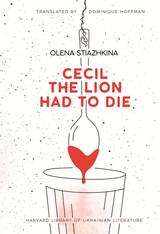
In 1986 Soviet Ukraine, two boys and two girls are welcomed into the world in a Donetsk maternity ward. Following a Soviet tradition of naming things after prominent Communist leaders from far away, a local party functionary offers great material benefits for naming children after Ernst Thälmann, the leader of the German Communist Party from 1925 to 1933. The fateful decision is made, and the local newspaper presents the newly born Ernsts and Thälmas in a photo on the front page, forever tying four families together.
In Cecil the Lion Had to Die, Olena Stiazhkina follows these families through radical transformations when the Soviet Union unexpectedly implodes, independent Ukraine emerges, and neoimperial Russia occupies Ukraine’s Crimea and parts of the Donbas. Just as Stiazhkina’s decision to transition to writing in Ukrainian as part of her civic stance—performed in this book that begins in Russian and ends in Ukrainian—the stark choices of family members take them in different directions, presenting a multifaceted and nuanced Donbas.
A tour de force of stylistic registers, intertwining stories, and ironic voices, this novel is a must-read for those who seek deeper understanding of how Ukrainian history and local identity shapes war with Russia.

The circus has fascinated Alexander Kluge ever since he was a child, and his devotion to it has been preserved throughout his cinematic output and his most recent literary work. In the circus, he finds both the shadow image of work and the epitome of human excellence, from love to war to revolution. As surfaces onto which utopias are projected, these elaborate performances offer a tangible representation of developments within civilization, with its nearly infinite possibilities and sometimes inevitable crashes—from the excited roar of the crowd to death on the floor of the ring.
In Circus Commentary, Kluge’s montage of modernities moves back and forth through time and space, expressing his unique mix of fictional and non-fictional reports, histories, and stories through semantic fields, images, and film sequences inserted in the book via QR codes. We encounter a broad panorama of perplexed artists and sophisticated surgeons cavorting alongside fighter pilots, sans-culottes drunk with dreams of omnipotence, and, most importantly, animals—to whose superhuman performances, this book creates a lasting memorial.
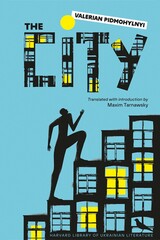
Valerian Pidmohylnyi’s The City was a landmark event in the history of Ukrainian literature. Written by a master craftsman in full control of the texture, rhythm, and tone of the text, the novel tells the story of Stepan, a young man from the provinces who moves to the capital of Ukraine, Kyiv, and achieves success as a writer through a succession of romantic encounters with women.
At its core, the novel is a philosophical search for harmony in a world where our intellectual side expects rational order, whereas the instinctive natural world follows its own principles. The resulting alienation and disorientation reflect the basic principles of existential philosophy, in which Pidmohylnyi is close to his European counterparts of the day.
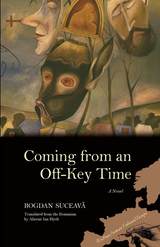
The fall of communism in Eastern Europe in 1989 marked, in one famous formulation, the "end of history." In his apocalyptic novel Coming from an Off-Key Time, Bogdan Suceavă satirizes the events in his native Romania since the violent end of the Ceauşescu regime that fateful year.
Suceavă uses three interrelated narratives to illustrate the destructive power of Romanian society’s most powerful mythologies. He depicts madness of all kinds but especially religious beliefs and their perversion by all manner of outrageous sects. Here horror and humor reside impossibly in the same time and place, and readers experience the vertiginous feeling of living in the middle of a violent historical upheaval.
Even as Coming from an Off-Key Time suggests the influence of such writers as Mikhail Bulgakov, the fantastic satirist of the early Soviet Union, Suceavă engages the complexities of a quickly changing country in search of its bearings and suspicious of its past. Bogdan Suceavă is an associate professor of mathematics at California State University, Fullerton. One of Romanian literature’s most promising and original young writers, he is the author of four novels, two books of short stories, and several collections of poems.
Alistair Ian Blyth’s previous translations include Filip Florian, Little Fingers (2009); Lucian Dan Teodorovici, Our Circus Presents (2009); and Catalin Avramescu’s An Intellectual History of Cannibalism (2009).
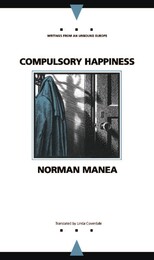
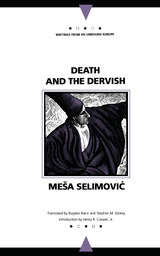
Hugely successful when published in the 1960s, Death and the Dervish is an enduring classic made into a feature length film in 1974.

Italian doctor Leonardo Pazzi and Alcesta, his “future lover,” travel through the picturesque, hilly region of Sloboda, near Kharkiv in northeast Ukraine. They experience a series of encounters with local Ukrainians and nature, disappearances, and transformations filled with paradoxes. The characters are bright, marionette-like caricatures whom the author constructs and moves ostentatiously in full view of the reader, revealing his artistic devices with a sense of absurd, mischievous humor.
A novel of exuberance and whim that deconstructs the very principles of writing and estranges everyday phenomena, Dr. Leonardo’s Journey marks the highpoint of Ukrainian modernism right before it was violently cut down by Stalin’s repressions. The novel shifts away from character or plot as such and instead celebrates the places and spaces in which these things come into being, and the sheer joy of movement and experience. In this sense, Maik Yohansen’s heroes echo Mykola Hohol, whose tour through Russia’s vast spaces in Nikolai Gogol’s Dead Souls is an obvious reference point, and Laurence Sterne, whose irreverent narrative style and textual games Yohansen emulates. Presented here in a contemporary, deft English translation, the novel is a must read for everyone interested in discovering the rich heritage of Ukrainian modernism.
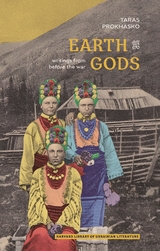
Earth Gods presents the early writings of Taras Prokhasko, one of Ukraine’s most prominent contemporary writers. Collected here for the first time in one book, these works span various genres yet form a single chronicle. Anna’s Other Days, Prokhasko’s first publication, testifies to the desire to free Ukrainian culture of overt influences of voices, styles, and genres that have dominated it for centuries. FM Galicia collects reflections delivered by the author at a Ukrainian radio show over a five-month period. Emphasizing the relevance of the oral genre as the origin of the text, Prokhasko has created a unique diary that strives to exist outside of literature and invites the reader to meditate on the human condition. The UnSimple—a novel whose action unfolds between the two world wars near Ialivets, in the Ukrainian Carpathian Mountains—documents the collapse of the grand narratives of the past, embodied here by the Carpathian earth gods who, despite their magical powers, are unable to save the patriarchal community they’ve been entrusted with from being overrun by the forces of modernization.
A master of reflexive, finely nuanced prose, Prokhasko weaves together narrative strands testifying to the sophistication and integration of Ukrainian culture with the world.
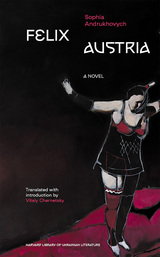
At the turn of the twentieth century, two young women find themselves in Stanyslaviv under Austro-Hungarian rule. Adela, the daughter of a wealthy German doctor, and Stefania, her orphan Ukrainian servant, could not be further apart socially and economically; but their fates intertwine in the cityscape of the late Habsburg Empire, densely inhabited by Ukrainians, Poles, Germans, and Jews for centuries. The intricate relationship between the two women—told by an unreliable narrator—unfolds against the backdrop of a rich ethnic, social, and cultural fabric that seems almost implausible to today’s reader who knows it to be irretrievably lost.
In Felix Austria, Sophia Andrukhovych uses techniques from Gothic literature to reconstruct with astonishing detail the atmosphere and the everyday life of Stanyslaviv. As if foreshadowing the wars to come and their devastation, the city’s population delights in earthly pleasures: extravagant dinner parties and receptions, mass celebrations, exotic theater performances, art exhibitions, glitzy shows of stars and starlets from near and far, local rituals of soap making, competition among fashionable dames, and much more. Felix Austria is a must-read for all those who seek to understand Ukraine’s deep ties with Western Europe and its struggle to break away from Russia’s orbit.
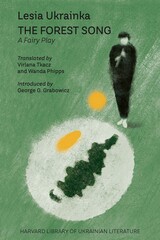
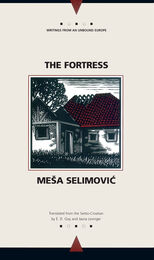
Set in Bosnia in the late 1700s, the novel sometimes functions as an artful metaphor for the communist Yugoslavia of Selimovic's day. At other times, the author explores the nuances of Ottoman rule in the Balkans. Muslim Ahmet's sustaining marriage to a young Christian woman provides a multicultural tension that strongly resonates with contemporary readers and sensibilities.
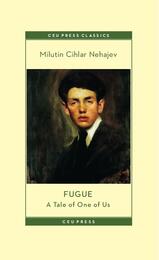
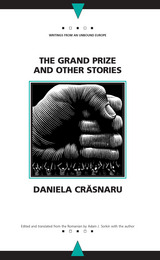
Crasnaru portrays the lives of people so used to hardship that it never occurs to them to surrender. An unhappily married woman waits in vain for a call from a potential lover. A foul-mouthed mother of seven accuses a war hero of conning her out of her life savings. A lawyer is lured to a forest by a dead coworker's stories of a beautiful woman. Those with drab lives use fantasy to endure and those who believe themselves happy are forced to face grim realities. Crasnaru mixes elements of the ridiculous, the fanciful, and the grotesque with vivid realism and her remarkable stories, while taking place in a dark era in her nation's history, are about the human as well as the Romanian condition.
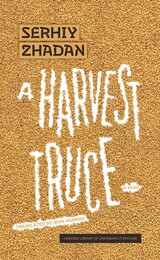
Brothers Anton and Tolik reunite at their family home to bury their recently deceased mother. An otherwise natural ritual unfolds under extraordinary circumstances: their house is on the front line of a war ignited by Russian-backed separatists in eastern Ukraine. Isolated without power or running water, the brothers’ best hope for success and survival lies in the declared cease fire—the harvest truce. But such hopes are swiftly dashed, as it becomes apparent that the conflagration of war will not abate.
With echoes of Waiting for Godot, Serhiy Zhadan’s A Harvest Truce stages a tragicomedy in which the commonplace experiences of death, birth, and the cycles of life marked by the practices of growing and harvesting food are rendered futile and farcical in the wake of the indifferent juggernaut of war.
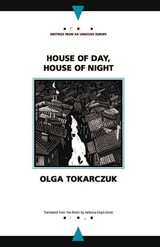
Winner of the Gunter Grass Prize
Nowa Ruda is a small town in Silesia, an area that has been a part of Poland, Germany, and the former Czechoslovakia in the past. When the narrator moves into the area, she and discovers everyone-and everything-has its own story. With the help of Marta, her enigmatic neighbor, the narrator accumulates these stories, tracing the history of Nowa Ruda from the founding of the town to the lives of its saints, from the caller who wins the radio quiz every day to the tale of the man who causes international tension when he dies on the border, one leg on the Polish side, the other on the Czech side. Each of the stories represents a brick and they interlock to reveal the immense monument that is the town. What emerges is the message that the history of any place--no matter how humble--is limitless, that by describing or digging at the roots of a life, a house, or a neighborhood, one can see all the connections, not only with one's self and one's dreams but also with all of the universe.
Richly imagined, weaving in anecdote with recipes and gossip, Tokarczuk's novel is an epic of a small place. Since its original publication in 1998 it has remained a bestseller in Poland. House of Day, House of Night is the English-language debut of one of Europe's best young writers.
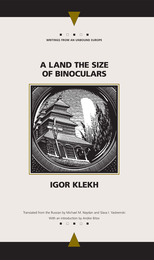
Throughout, Klekh studies landscapes as intimate as the terrain between fathers and sons and as broad as the wild, mysterious Carpathian Mountains. His work has been compared to that of Borges, Eco, and the magical realists, and celebrated for its synthesis of numerous literary traditions, its use of esoteric knowledge, and its breathtaking prose.
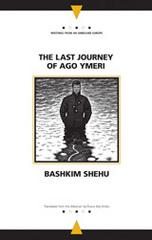
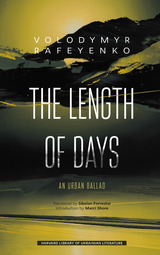
The Length of Days: An Urban Ballad is set mostly in the composite Donbas city of Z—an uncanny foretelling of what this letter has come to symbolize since February 24, 2022, when Russia launched a full-scale invasion of Ukraine. Several embedded narratives attributed to an alcoholic chemist-turned-massage therapist give insight into the funny, ironic, or tragic lives of people who remained in the occupied Donbas after Russia’s initial aggression in 2014.
With elements of magical realism, Volodymyr Rafeyenko’s novel combines a wicked sense of humor with political analysis, philosophy, poetry, and moral interrogation. Witty references to popular culture—Ukrainian and European—underline the international and transnational aspects of Ukrainian literature. The novel ends on the hopeful note that even death cannot have the final word: the resilient inhabitants of Z grow in power through reincarnation.

A longboat plummets over the Great Falls, drowning the five passengers on board. The Lockmaster, the heir to an ancient title and responsible for guiding river traffic safely around this natural barrier on the White River, ought to have prevented this tragedy. His son is convinced that it was not an accident. Is his irascible father a murderer? A hydraulic engineer all too familiar with the brute force of rivers, he sets out to discover the truth and find his missing father.
The Lockmaster is a dramatic tale set in a world where water has become a precious commodity and Europe has fractured into warring ethno-nationalist entities desperate to uphold the traditions and insignia of a so-called glorious bygone era. Christoph Ransmayr recounts this story in his trademark style, its epic force shot through with visions of future technology and reactionary politics amid a climate breakdown. At heart, though, this novel is the story of a father–son relationship straddling the fault lines between past and present, and an exploration of timeless questions of guilt and forgiveness.
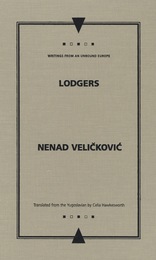
Published as the siege of Sarajevo ended, Lodgers is a hilarious, unsentimental report from the front lines of the Balkan wars of the 1990s. Detergent mixed with flour, museum relics sold to U.N. peacekeepers, the magic power of laminated accreditation-all of the folly and the horror of that time are revealed in the sarcastic report of the novel's teenage would-be authoress.
Maja lives in the basement of a Sarajevo museum, enduring with equal annoyance Serb artillery and vegetarian meals that taste like fried sponge. Her father, the museum director, zealously guards the treasures upstairs while their aged co-lodger Julio plots to trade them away. Maja's mother copes with yoga while dour stepbrother Davor endures the endless crying and cravings of his pregnant wife. Floating amidst it all is Maja's grandmother, blind and deaf, yet drawn to any conversation involving food.
Need and crisis propel Maja and her companions from one humorous situation to another. Yet her pitch-perfect gallows humor makes it clear that the brutalities of war penetrate these small moments of life-and even the self-centeredness of a teenaged girl. A best seller in the Balkans and widely translated in Europe, Lodgers is an uncompromising novel about a modern tragedy.
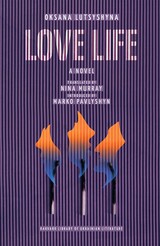

Simon Blef, who comes from “a small, stifling country without a sea” in some corner of Europe, has gone to live in the Netherlands. There he has found a wife and hopes he may yet find work. He is making preparations: he carries around a notebook and jots down his thoughts. One day he would like to write a novel, but in the meantime, he records, embellishes, invents, and combines what he sees with what he dreams: the happy, hard-working Dutch, with their seventy-year-old hippies—the “superannuated generation of rockers”— and their new “sexless generation,” as well as the tourists and immigrants from beyond the seven seas.
Set in a single day, Making Skeletons Dance is full of impressionistic musings, in equal measure mordant and humorous. Simon has left his small unhappy country to get away from the past—but how is it that the past is so devilishly resourceful, liable to turn up in any Amsterdam pub? As the afternoon wears on, the drama of his life unfolds in fascinating detail, be it comedy or tragedy, or both.
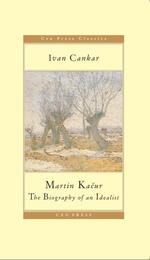
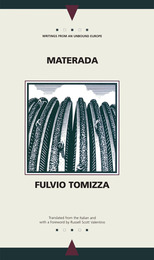
A picture of a disappearing way of life, a tale of feud and displacement, and imbued with the tastes, tales, and songs of his native Istria, Koslovic's story is a testament to the intertwined ethnic roots of Balkan history.
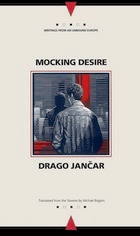
Gregor Gradnik, a Slovenian writer, enters the sensual and seething life of New Orleans to teach a creative writing class at a university. Gregor at first acts as only an observer, yet seductive New Orleans soon draws him into a series of bizarre erotic, professional, and social relationships. A profound and entertaining work, Mocking Desire provides the English-speaking world with the perfect introduction to one of Eastern Europe's leading writers.
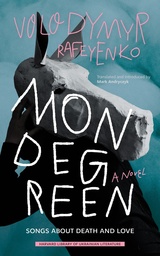

Nestled deep in the Bohemian Forest, Sára’s world is quiet and bound to the rhythms of nature. She has wandered the same wooded trails for seven years, filling her basket with mushrooms, her pockets with memories, and her thoughts with the past she cannot quite escape. The solitude suits her—until the death of her mother forces her to confront the tangled roots of family and the wounds that never fully healed. As Sára meticulously sorts through chanterelles and boletes, she also sorts through childhood recollections and the uneasy inheritance of trauma. The forest offers refuge, but it also holds secrets, and as the seasons shift, so does Sára’s understanding of herself and the complicated bonds that tether her to the world.
With melodic prose and an acute sensitivity to how landscapes shape lives, Viktorie Hanišová crafts a novel of quiet intensity and deep introspection. The Mushroom Gatherer is a haunting meditation on loss and the delicate balance between isolation and connection, perfect for readers drawn to atmospheric fiction.
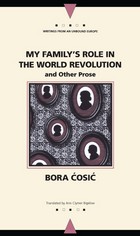
During the German occupation of Belgrade, a family—including an alarmist mother, an eternally drunk father, two young aunts who swoon over American movie stars, and a playboy uncle—attempt to find any kind of work they can do at home. When the postwar Socialist society is being ushered in after the war, the narrator becomes the slogan-spouting ideological leader of the household, while his family tries—and often fails miserably—to take part in the "great change."
This volume also includes several Ćosić short stories, and recent essays on the war in the former Yugoslavia.
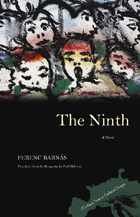
Set in a sleepy village north of Budapest in 1968, this touching, unsettling novel paints a richly wrought portrait of mid-twentieth-century Hungary. The narrator is the ninth child of a family distinguished by its size, poverty, faith, and abundance of physical and psychological disabilities. His confusion is exacerbated by the strict, secretive Catholic household his parents keep in the face of a Communist system. These dual oppressions propel him toward an inevitable realization of his guilt and desire that speaks to his struggle with a fateful, seamless beauty.
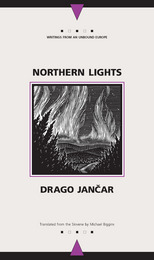
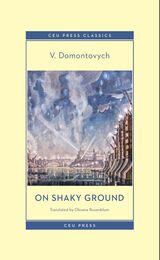
On Shaky Ground is a modernist novel written in the late 1930s and early 1940s and was originally published in Nazi occupied Kharkiv in 1942. One of the best examples of intellectual fiction of the time, the work summarizes the struggles of the Ukrainian intelligentsia in the late 1920s and early 1930s, when totalitarian reality, together with rampant industrialization, started to affect everyday life.
V. Domontovych is the pen name of Viktor Petrov, a historian and archaeologist, a representative of neoclassicism in Ukrainian literature. The novel follows the trajectory of art historian, Rostyslav Mykhailovych, who goes on a work trip from the capital city of Kharkiv to provincial Katerynoslav (today Dnipro), the place where he spent his childhood. In the late 1920s, a section of the Dnipro River became the place of a major industrial project, the construction of the largest hydroelectric station in Ukraine (Dniprelstan), which flooded the rapids over the river and led to serious ecological and social changes in the region. While the main goal of the trip is to save an old church from being turned into a museum, the journey becomes a philosophical reflection on dislocation and loss of connection with one’s birthplace, traditions, religion and more globally, a sense of security.
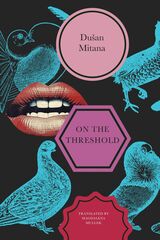
An unhappily married woman is impregnated by her elderly neighbor who lives in a building across the street and with whom she has never had any physical contact. Just as his attention creates life within her, his own life waxes and wanes with her gaze and attention.
A man finds himself trapped in a pub on a sweltering afternoon after refusing to buy a beer with his cigarettes. Guarded by a vigilante bartender and his beer-obsessed patrons, his every attempt at escape is foiled until their life-giving elixir, the beer, runs out.
This collection introduces English-language readers to the work of Dušan Mitana, a cult figure in contemporary Central European literature. In Mitana’s stories, appearing in English for the first time, the rational and the irrational are indistinguishable. His tales infect a banal, quotidian realism with mystical and supernatural distortions. Tinged with Hitchcockian paranoia and full of unexpected turns, the seventeen stories collected here offer a glimpse into Mitana’s trademark absurdist style.

What if paradise was not a place we lost, but one we never truly knew? In Paradisiacs, the fourth volume of the Last Kingdom series, Pascal Quignard meditates on the nature of paradise—not as an Eden to which we might return, but as a place of origin that lingers in myth. Through his signature blend of ancient texts, Paleolithic art, psychoanalysis, and personal reflection, Quignard explores our primal longing for recognition. He traces this yearning back to the erstwhile, a prenatal paradise from which we are expelled at birth, and examines how resemblance and recognition shape our identities.
At once poetic and philosophical, Paradisiacs invites readers into Quignard’s singular world, where language and history coalesce into a profound rumination on the origins of selfhood. With John Taylor’s masterly translation, this latest installment of Last Kingdom is a hypnotic and revelatory reading experience for those drawn to the intersections of philosophy and the ineffable.
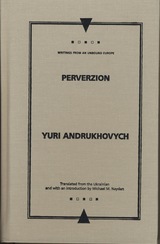
Or, then again, it may not.
Perverzion constructs Perfetsky's final days using a mishmash of relics, from official documents to recorded interviews to scraps of paper. Perfetsky, the personification of the Ukrainian artistic superman—he used his masterful musicianship in a collaboration with Elton John during the pop star's secret sojourn in Ukraine—is bound for Venice to participate in a seminar to save the world from absurdity. On the way he becomes a Ukrainian Orpheus descending into the decadence of the West, navigating through surrealistic adventures and no less surrealistic seminar topics as he charges head up (and pants down) toward his fate.
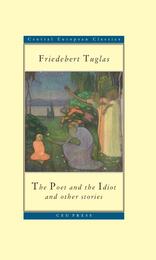
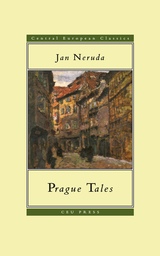
This is a collection of Jan Neruda's intimate, wry, bittersweet stories of life among the inhabitants of the Little Quarter of nineteenth-century Prague. These finely tuned and varied vignettes established Neruda as the quintessential Czech nineteenth-century realist, the Charles Dickens of a Prague becoming ever more aware of itself as a Czech rather than an Austrian city.
Prague Tales is a classic by a writer whose influence has been acknowledged by generations of Czech writers, including Ivan Klíma, who contributes an introduction to this new translation.
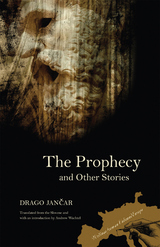
These newly collected short stories reveal a master at the top of his game. Drago Jancar possesses an acute understanding of the human psyche, enabling his stories to resonate beyond their particular milieu. This collection features seven pieces, drawn from four different collections, that together present the struggle of individuals against powerful forces. The characters try to make sense of a world of shifting borders and changing names that make the idea of a "homeland"—either literal or figurative—a dream rather than a reality.
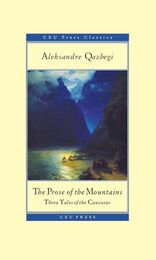
The Prose of the Mountains contains three tales of the Caucasus by Aleksandre Qazbegi, one of the most prescient and gifted chroniclers of the Georgian encounter with colonial modernity. His stories offer an invaluable counterpoint to the predominantly Russian narratives that have hitherto shaped scholarly accounts of the nineteenth-century Caucasus. “Memoirs of a Shepherd” poignantly chronicles the young author’s decision to pass seven years of his life as a shepherd with Georgian mountaineers. “Eliso” (the name of a Chechen girl) offers one of the most searing accounts on record of the forced migration of this people from their homeland to Ottoman lands. Set in the sixteenth century, “Khevis Beri Gocha” (the name of a Georgian village chief) classically chronicles a tragic misunderstanding between a severe father and his loving son.
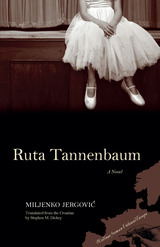
Using their shared Jewish heritage as a starting point, Jergovic constructs a fictional family history populated by historical figures with the precocious Ruta at the center. Stephen Dickey’s translation masterfully captures Jergovic´’s colloquial yet deeply observed style, which animates the tangled and troubled history of persecution and war in Croatia.
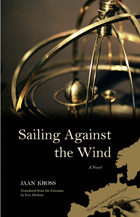
Jaan Kross's historical novel Sailing Against the Wind fictionalizes the life of Bernhard Schmidt (1879–1935), an Estonian-born inventor. Schmidt lost an arm in his youth while experimenting with a homemade rocket, resulting in psychological trauma that would plague him for the rest of his life. Largely self-taught, Schmidt was driven to seek recognition of his talents.
He moved to Germany in the 1930s, where, after perfecting techniques for polishing lenses, he began developing ideas for improving astronomical telescopes. He was arrested for selling one to the Russians, and although he got off with only a warning, he later suffered a breakdown and was sent to a mental hospital, where he soon died. Sailing Against the Wind becomes a meditation on national identity, the relationship between history and the individual life, and the mechanisms of the historical novel as a genre.
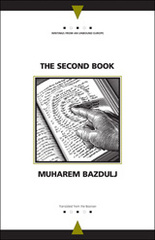
Muharem Bazdulj has broken from the pack of new Eastern European writers influenced by innovators such as Danilo Kiš, Milan Kundera, and Jorge Luis Borges. Employing a light touch, a daring anti-nationalist tone, and the kind of ambition that inspires nothing less than a rewriting of Bosnian and Yugoslavian history, Bazdulj weaves the imagined realities of history into fiction and fiction into history. To quote one critic, for Bazdulj history "is the sum of interpretations while imagination is the sum of facts."
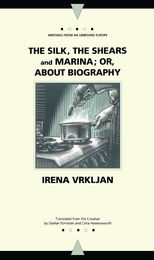
These are the first two volumes of the Croatian poet and novelist Irena Vrkljan's lyrical autobiography. Although each novel illuminates the other, they also stand alone as original and independent works of art. In The Silk, the Shears, Vrkljan traces the symbolic and moral significance of her life, and her vision of the fate of women in her mother's time and in her own. Marina continues the intense analysis of the poetic self, using the life of Marina Tsvetaeva to meditate on the processes behind biography.

The Sorrowful Eyes of Hannah Karajich is a lyrical, deeply moving story of love and the pain of emancipation, set in the now vanished world of rural East European Jewish village life. Hanna is the most beautiful girl in all Polona, a Hasidic community in the remote province of Sub-Carpathian Ruthenia. Involvement in the exciting new movement of Zionism takes her away to a commune in a nearby town. But there she meets and falls in love with the strangely named Ivo Karajich: a Jew, yet not a Jew. The agonizing drama that follows, plants into her beautiful almond-shaped eyes the hard grain of sorrow that her children, too, will inherit.
Olbracht's novella is both a great love story and a marvellous portrait of a world that modernity threatened and Hitler destroyed.

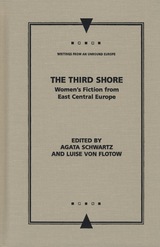
A rich compendium of fiction by twenty-five women from eighteen different nations ranging from Lithuania to Ukraine to Poland, the Czech Republic, Romania, Albania, and Slovenia, The Third Shore brings to light a whole spectrum of women's literary accomplishment and experience virtually unknown in the West. Gracefully translated, and with an introduction that establishes their political, historical, and literary context, these stories written in the decade after the fall of the Iron Curtain are tales of the familiar-of illness and death, love and desire, motherhood and war, feminism, and patriarchy-reconceived and turned into something altogether new by the distinctive experience they reflect.




In Ukraine, War, Love, Olena Stiazhkina depicts day-to-day developments in and around her beloved hometown Donetsk during Russia’s 2014 invasion and occupation of the Ukrainian city. An award-winning fiction writer, Stiazhkina chronicles an increasingly harrowing series of events with sarcasm, anger, humor, and love.
The diary opens on March 2, 2014, as the first wave of pro-Russian protest washes over eastern Ukraine in the wake of Euromaidan, the Revolution of Dignity, and it closes on August 18, 2014, the day a convoy of civilian Ukrainian refugees is deliberately slaughtered by Russian forces. Early on, Stiazhkina is captured by pro-Russian forces while she browses for books but is freed when one of her captors turns out to be a former student. Vignettes from her personal life intermingle with current events, and she examines ordinary people in extraordinary circumstances. We walk with local dogs and their owners; we meet a formidable apartment building manager who shames occupiers and dismantles their artillery from the roof of her building; we follow a family evacuated to Kyiv whose young son builds checkpoints out of Legos. Olena Stiazhkina’s Ukraine, War, Love: A Donetsk Diary is a fierce love letter to her country, her city, and her people.

This historical novel—Visoška kronika in the Slovene original—is about two generations of the owners of the Visoko estate in the Duchy of Carniola, a predominantly Slovene province of the Habsburg Empire, in the seventeenth century. The events of the estate and the fate of its owners are affected by witchcraft persecutions, the mistreatment of Protestants, and the Thirty Years’ War. These themes are key to the construction of a Slovene national identity, which was going through a decisive phase as Tavčar was writing. By the time the novel was released in 1919, his nation had left the Habsburg Crown for the new Kingdom of Serbs, Croats, and Slovenes.
The work is both romantic and realistic. The deeply romantic motive of crime, repentance, and punishment intertwines the lives of father and son. The very acquisition of the estate is connected to a murder, which casts a long shadow over the next generation. Tavčar insists on the principle of man’s full responsibility for his acts, which can be repaired with action and determination. The author’s bleak realistic description of the farm life at Visoko reflects his polemical view of the Slovene farmer of his time.


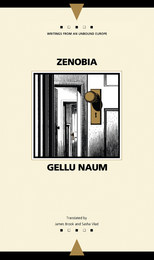
His wife, artist Lyggia Naum, was the inspiration for the title character. In this 1985 masterpiece, penned in the twilight of the totalitarian regime of Nicolae Ceausescu, love, in all its intimate, carnal communion, lights the path through the dark forest, the streets of Bucharest, and the desert swamps. The narrator, speaking from the depths of love and despair, invites the reader to share his quest. Highly praised now and then, Zenobia is an enduring avant-garde classic of twentieth-century Eastern European literature.
READERS
Browse our collection.
PUBLISHERS
See BiblioVault's publisher services.
STUDENT SERVICES
Files for college accessibility offices.
UChicago Accessibility Resources
home | accessibility | search | about | contact us
BiblioVault ® 2001 - 2025
The University of Chicago Press






